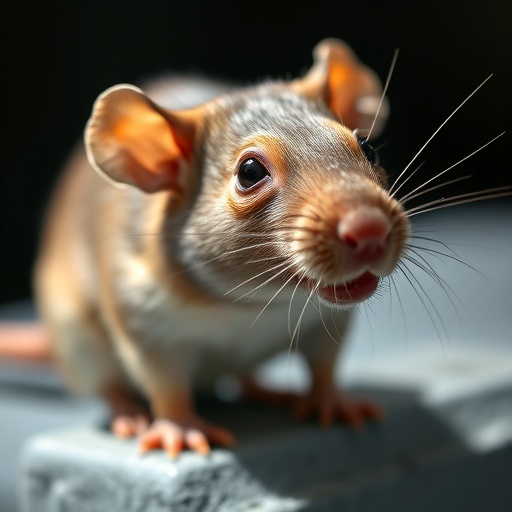In a groundbreaking study that sheds light on the impact of gastrointestinal parasites on laboratory rats, researchers have documented significant hematological, biochemical, and histopathological changes following natural infections. This field of research, critical for understanding host-parasite interactions, provides valuable insights that could potentially benefit both animal health and the development of new treatments.
The study, conducted by an expert team of scientists including Ofori, S.A., Amissah-Reynolds, P.K., and Addo, A.K., reveals how these parasites can alter the internal environment of their hosts, leading to varying degrees of illness and biochemical disturbances. The implications of such infections are profound as they not only affect individual animals but may also have repercussions in broader ecological and zoonotic contexts.
In the realm of hematology, significant alterations were observed in the blood profiles of the infected rats. These changes were characterized by variations in red blood cell counts, hemoglobin concentrations, and overall hematocrit levels. Such anemic conditions can lead to diminished oxygen transport capacity, drastically impacting the overall vigor and health of the infected animals. The study highlights that these hematological parameters are crucial indicators of the degree of parasitic infestation and can serve as valuable metrics for assessing the health of laboratory animals.
Biochemical analyses conducted in the study unveiled a host of metabolic disturbances. Elevated liver enzymes, indicative of hepatic damage, were prevalent among the infected rats, suggesting that gastrointestinal parasites may trigger significant systemic stress responses. Additionally, alterations in serum protein levels pointed to disruptions in protein metabolism, which is vital for maintaining various physiological functions. This biochemical profile not only aids in the diagnosis of parasitic infections but also underscores the importance of monitoring metabolic health in laboratory settings.
Histopathological examinations further illustrated the extent of the damage inflicted by gastrointestinal parasites. Tissue samples revealed inflammation, necrotic lesions, and other pathological changes within the gastrointestinal tract and related organs. Such findings are crucial, as they provide a deeper understanding of the mechanistic routes through which these parasites inflict harm and elicit host responses. The detailed examination of tissues will assist researchers in identifying the specific types of parasites involved and the pathophysiological processes they employ to exploit their hosts.
Moreover, the research emphasizes the significance of understanding the epidemiology of gastrointestinal infections. With the increasing overlap between human and animal habitats, the potential for zoonotic transmission remains a pressing concern. The findings raise vital questions regarding how these infections could be managed to minimize cross-species transmission, particularly in areas where wildlife and domestic animals coexist.
Beyond the direct impact on laboratory rats, the implications of this study extend to veterinary science and agricultural practices where livestock health is paramount. Understanding the hematological and biochemical changes caused by parasites can lead to improved diagnostic measures and more effective treatment protocols. Such insights could facilitate better management practices in both veterinary and agricultural settings, ultimately enhancing animal well-being and productivity.
With rising global interest in parasitic diseases, this research provides a timely and relevant perspective on an often-overlooked aspect of veterinary science. By focusing on the interplay between host and parasite, the study highlights the necessity for continued research in this area to inform public health strategies and animal welfare programs.
The study also opens avenues for future research aimed at exploring treatments that can mitigate the effects of parasitic infections in both laboratory and agricultural animals. Development of novel antiparasitic agents or vaccination strategies could be informed significantly by the understanding gained through this and similar studies.
As environmental conditions continue to change and habitats are disturbed, understanding the dynamics of gastrointestinal parasites will become increasingly important. The findings of this research serve as a reminder that the health of laboratory animals is interlinked with larger ecological systems. Researchers, practitioners, and policymakers must collaborate to ensure the health of all species while addressing the challenges posed by parasites.
Finally, the study underscores the critical need for enhanced surveillance and diagnostic strategies in both clinical and research environments. With gastrointestinal parasites presenting a significant challenge to animal health and productivity, adopting a proactive approach could lead to more effective interventions.
This innovative study not only enriches the scientific community’s understanding but also encourages holistic approaches to animal health that involve careful monitoring, prevention, and treatment. Efforts to translate findings from laboratory settings to practical applications in veterinary science could yield significant benefits, ultimately leading to healthier animals and safer food supplies.
In conclusion, the comprehensive evaluation of hematological, biochemical, and histopathological changes in laboratory rats infected with gastrointestinal parasites presents a pivotal step in the ongoing quest for improved animal health management. By understanding these complex interactions, we pave the way for innovative solutions that can mitigate the burden of parasites on laboratory animals and livestock alike.
Subject of Research: The effects of gastrointestinal parasites on hematological, biochemical, and histopathological parameters in laboratory rats.
Article Title: Hematological, biochemical, and histopathological changes in laboratory rats naturally infected with gastrointestinal parasites.
Article References: Ofori, S.A., Amissah-Reynolds, P.K., Addo, A.K. et al. Hematological, biochemical, and histopathological changes in laboratory rats naturally infected with gastrointestinal parasites. Discov Anim 2, 19 (2025). https://doi.org/10.1007/s44338-025-00064-z
Image Credits: AI Generated
DOI: 10.1007/s44338-025-00064-z
Keywords: Gastrointestinal parasites, hematological changes, biochemical alterations, histopathology, laboratory rats, animal health.
Tags: anemic conditions in infected animalsassessing health in laboratory animalsbiochemical disturbances from parasitesblood profile alterations in ratsecological impact of parasitesgastrointestinal parasites studyhematological changes in ratshost-parasite interactions researchlaboratory rat healthparasite infection effectstreatment development for parasitic infectionszoonotic disease implications





